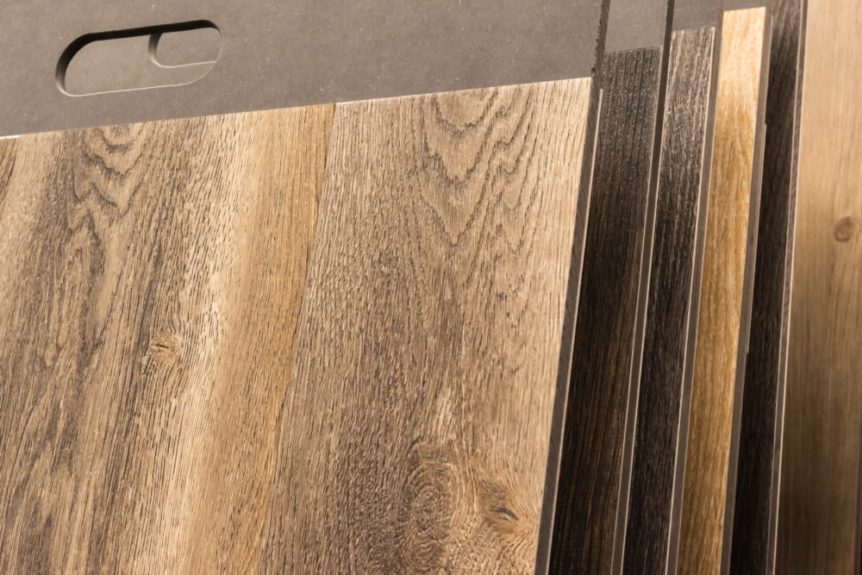
Pros & Cons of Vinyl Flooring
On this blog we’ve looked at laminate flooring, engineered hardwood flooring, and carpet, so we figured it was time to look at another popular flooring option: vinyl.
According to The Spruce, by the 1950s vinyl flooring had “surpassed linoleum’s position as the best low-cost water-resistant flooring option for locations such as bathrooms and kitchens,” and it’s still a popular choice today. What makes it so special?
Pros of Vinyl
- 100% Moisture Resistance. You read that right: 100%! This makes it ideal for kitchens, bathrooms, mudrooms, laundry rooms, and basements.
- Difficult to Damage. This durable flooring will easily last up to 20 years or more if cared for properly. It also can withstand heavy foot traffic and won’t chip, crack, or shatter.
- Antimicrobial. Some companies will apply an antimicrobial coating on their vinyl planks, which only further aides in its practically bullet-proof appeal.
- Several Style Options. Do you want a tiled look? Stone? Natural wood? Neutral colors? Bold? Bright? Patterned? Solid? Shiny? Weathered? Whatever your style, vinyl’s got you covered.
- Low Maintenance. Vinyl is quite possibly the easiest type of flooring to maintain. Sweep and mop – the end.
- Inexpensive. Vinyl is one of the most affordable flooring options available, costing anywhere from $0.50-$7 per square foot. Even the most high-end vinyl costs around $10 per square foot, which according to The Spruce is “still less expensive than premium flooring choices, such as stone.”
- Easy Installation. Vinyl can be installed directly on top of the previous flooring’s subfloor, and can be “clicked” or even glued in – any homeowner who wants to can do it entirely themselves without much prework. The only time you may actually need to hire a professional to install vinyl is if you’re using full sheets of vinyl.
- Comfort. Vinyl is softer than many flooring options, making it easier to stand on for long periods of time. It also rarely gets cold, making it nice for those winter months. Some options are even padded, making it extra comfortable! Because of its softness, there’s also a good chance that if you drop a glass, it won’t break!
Cons of Vinyl
- Not Eco-Friendly. Vinyl flooring is not biodegradable and very difficult to recycle, so it old or used vinyl will almost always end up in a landfill. It’s also made up of “polyvinyl chloride (PVC) and will emit volatile organic compounds (VOC)” according to Realtor.com.
- Beware of Sharp Objects. As mentioned in the pros, vinyl is difficult to damage, and may even help prevent damage to certain items. However, it can be cut or pierced very easily by a sharp object, such as broken glass or a knife. Furniture might also gauge or damage vinyl flooring, and so furniture pads need to be placed on the feet of any furniture being moved around.
- Difficult to Repair. While it may be difficult to damage overall, if damage does occur to vinyl, it’s difficult to repair as it cannot be refinished and instead needs to be replaced. (If your home utilized tiles or planks of vinyl as opposed to sheets, these can of course be replaced individually, making this not as much of a con.)
- Stains and Yellows Easily. Some older forms of vinyl will yellow over time or can fade if exposed too long to direct sunlight, although many newer vinyl floorings tend to be more fade- and yellow-resistant. And while most spills can be easily wiped up, certain materials (such as rubber on shoes or mats) can permanently scuff and stain the vinyl.
- Subfloor Prep. While a previous subfloor can easily be used to install vinyl flooring on top of, the subfloor does need to be perfectly smooth and free of all excess dirt or particles to do so properly. If not done correctly, your flooring job will either be bumpy or won’t last as long as it would otherwise.
- Resale Value. Vinyl stone or vinyl wood flooring won’t do anything for the resale value of your home, as vinyl just isn’t the real deal.
Is Vinyl Right For You?
Even with some of its cons, vinyl is still a great flooring option that would be an excellent addition to any home. Ultimately, the choice is up to each individual homeowner. Flooring is a vital part of any and every home, so it’s worth it to do some research ahead of time. We hope this article was helpful, and if you have any questions or want see our wide selection of vinyl and other flooring options, call or stop by Claude Brown’s today!




